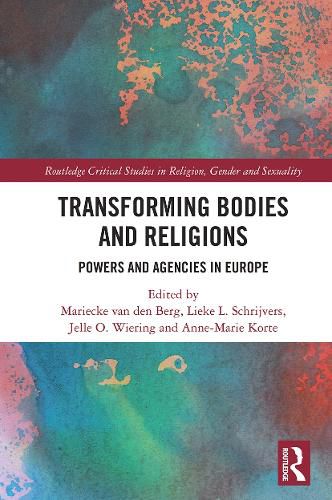Readings Newsletter
Become a Readings Member to make your shopping experience even easier.
Sign in or sign up for free!
You’re not far away from qualifying for FREE standard shipping within Australia
You’ve qualified for FREE standard shipping within Australia
The cart is loading…






This book sheds an interdisciplinary light on ‘transforming bodies’: bodies that have been subjected to, contributed to, or have resisted social transformations within religious or secular contexts in contemporary Europe. It explores the intersections of race, ethnicity, gender, sexuality and religion that underpin embodied transformations. Using post-secularist, postcolonial and gender/queer perspectives, it aims to gain a better understanding of the orchestrations and effects of larger social transitions related to religion.
This volume is the outcome of the intensive collaboration of the authors, who for years have been meeting regularly in Utrecht, the Netherlands, to discuss themes related to religion and ‘the challenge of difference’, with an added afterword by Prof. Pamela Klassen from the University of Toronto. The book is divided in three subsections that focus on particular types of embodiment: body politics in governmental and NGO organisations; the role of the body in literary and/or autobiographical narratives; and ethnographic case studies of bodies in daily life.
Doing so, it provides an innovative exploration of contemporary religion and the body. It will, therefore, be of great interest to scholars of Religious Studies, Gender and Sexuality Studies, Post-Colonial Studies, Anthropology, Sociology, Theology, and Philosophy.
$9.00 standard shipping within Australia
FREE standard shipping within Australia for orders over $100.00
Express & International shipping calculated at checkout
This book sheds an interdisciplinary light on ‘transforming bodies’: bodies that have been subjected to, contributed to, or have resisted social transformations within religious or secular contexts in contemporary Europe. It explores the intersections of race, ethnicity, gender, sexuality and religion that underpin embodied transformations. Using post-secularist, postcolonial and gender/queer perspectives, it aims to gain a better understanding of the orchestrations and effects of larger social transitions related to religion.
This volume is the outcome of the intensive collaboration of the authors, who for years have been meeting regularly in Utrecht, the Netherlands, to discuss themes related to religion and ‘the challenge of difference’, with an added afterword by Prof. Pamela Klassen from the University of Toronto. The book is divided in three subsections that focus on particular types of embodiment: body politics in governmental and NGO organisations; the role of the body in literary and/or autobiographical narratives; and ethnographic case studies of bodies in daily life.
Doing so, it provides an innovative exploration of contemporary religion and the body. It will, therefore, be of great interest to scholars of Religious Studies, Gender and Sexuality Studies, Post-Colonial Studies, Anthropology, Sociology, Theology, and Philosophy.